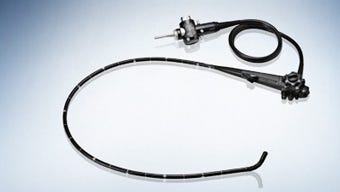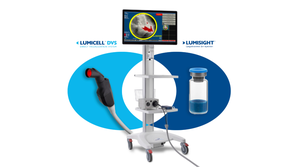June 1, 2015
The Japanese multinational revealed the U.S. Justice Department investigation in a financial filing. In addition, the company is setting aside nearly half a billion dollars as it seeks to settle a federal investigation into possible sales kickbacks.
Why Duodenoscope-related Infections Are a Big DealFDA's reaction to duodenoscope-related infections could ultimately impact makers of nearly all medical devices, says Michael Drues, PhD, president of Vascular Sciences (Boston). |
Chris Newmarker
Olympus duodenoscopes are apparently receiving scrutiny from U.S. federal investigators after they were linked to superbug outbreaks at hospitals in Seattle, Los Angeles, and outside Chicago.
The U.S. Department of Justice issued a subpoena to Olympus' Olympus Medical Systems Corp. subsidiary in March, the company said in financial filing last month.
Olympus meanwhile noted in the same financial filing that it has recorded a nearly 59 billion yen (about $472 million) provision related to an anti-kickback investigation that the DOJ started in 2011. Olympus says it is in discussions with U.S. officials to resolve the matter, which involved sales activities of Olympus' Olympus Corp. of the Americas subsidiary.
The provision was recorded in Olympus' fiscal year ended March 31.
A number of Olympus subsidiaries have also been named in civil lawsuits claiming that hospital patients were harmed or died because of duodenoscopes.
Lawsuits claim the Japanese electronics giant redesigned its Olympus TJF-Q180V duodenoscope last year, but provided hospitals and doctors with cleaning instructions for an older model.
At least seven patients were infected and two died from the drug-resistant superbug at UCLA's Ronald Reagan Medical Center. Hospital officials think 179 patients may have been exposed to CRE from a contaminated, reprocessed Olympus duodenoscope.
The Virginia Mason Medical Center in Seattle has meanwhile gone as far as to join a widow's lawsuit against Olympus, claiming the company allegedly sold defective duodenoscopes that led to a superbug outbreak that affected 39 patients from 2012 to 2014. Another outbreak was reported at Advocate Lutheran General Hospital outside Chicago.
Sold in the United States by manufacturers including Fujifilm, Olympus, and Pentax, duodenoscopes are threaded down through the digestive tract and into the small intestine. They provide the least invasive way of draining fluids from pancreatic and biliary ducts blocked by cancerous tumors, gallstones, or other conditions. But the duodenoscopes' movable "elevator" mechanism at the tip, while improving efficiency and effectiveness, are challenging to disinfect, according to FDA.
FDA has received 142 reports of infections potentially related to duodenoscopes. The agency organized an advisory panel to look into the safety of the devices. Last month, the panel recommended drastically improving cleaning techniques for duodenoscopes linked to the superbug outbreaks.
While it is not bound to, FDA generally follows the advice of such panels.
"This could be right up there with the infusion pump malfunctions, which led to the FDA requiring usability testing for devices, and the breast implant fiasco in the 1990s, which led FDA to revamp its biocompatibility guidelines," Michael Drues, PhD, president of Vascular Sciences (Boston), recently told Qmed. "The ramifications could touch devices used in cardiology, neurology, oncology--pretty much ever '-ology' you could think of."
In Other Federal Investigation News...
Olympus may not be alone when it comes to medical device companies receiving scrutiny from federal investigators. The Wall Street Journal recently reported that the FBI is looking into what Johnson & Johnson officials knew about the dangers of power morcellators spreading cancer when they sold the once-popular surgical device.
Refresh your medical device industry knowledge at MD&M East in New York City, June 9-11, 2015. |
Chris Newmarker is senior editor of Qmed and MPMN. Follow him on Twitter at @newmarker.
Like what you're reading? Subscribe to our daily e-newsletter.
About the Author(s)
You May Also Like



